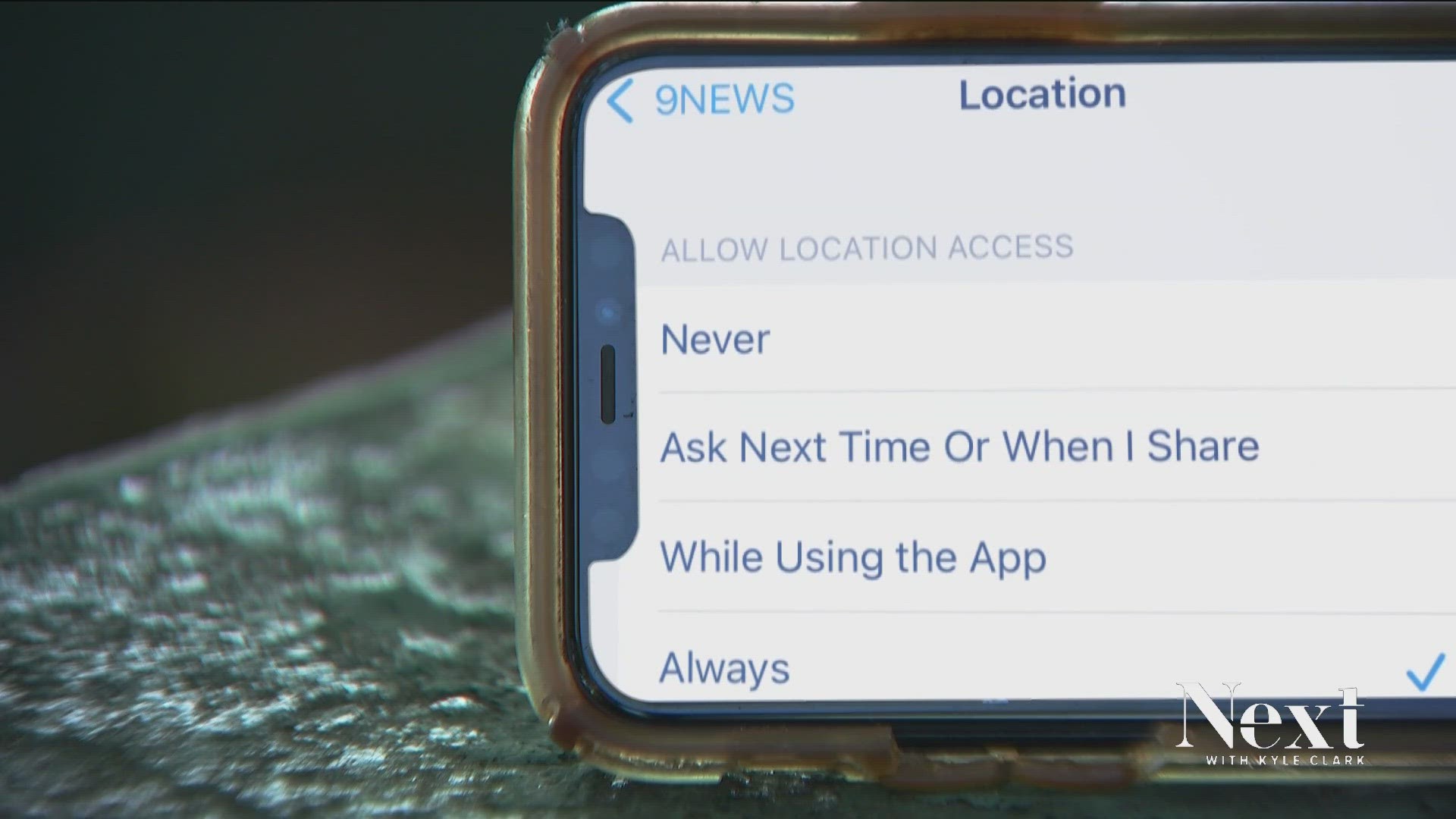DENVER — Every time you leave the house, no matter where you live, you are helping the city of Denver and you don't even know it.
Denver Parks and Recreation has recently made some changes based on your feedback. If you do not remember giving any feedback, it is because your phone did it for you.
“It’s a foot traffic analysis program,” Colten Rohloff of Denver Parks and Recreation said.
Rohloff has a title that could fill an 11 x 17 business card: Assistant Director of Capital Finance and Analytics and Planning Design and Construction for Denver Parks and Recreation.
“Parks don’t have a gate. We have no entrance. We have no door. We have no receipts. We have no way of knowing who is in the parks and where they’re coming from,” Rohloff said.
He knows his data.
“I understand, I definitely understand the creepiness here,” Rohloff said.
The city gets data from Placer.ai, which gets data from your cell phones.
“The agency and the city and county of Denver is not collecting this information. We are buying a subscription to a service that already does. This data exists whether we use it or not,” Rohloff said. “I can understand some discomfort with that, I can. The reality is that’s, kind of, the price you pay for free apps. The rule is, if you don’t have to pay for it, you’re the product. You don’t pay for a free app. They sell your information to make money.”
The information the city gets does not identify specific people or owners of the cell phones. It is anonymous data that tracks where a cell phone has been.
“This de-identified, aggregated cell phone information is the best tool that we have to figure out how the parks are being used, when they’re being used, who’s using them, where are they coming from,” Rohloff said.
This data is how the city knows that Red Rocks is the most popular overall city park.

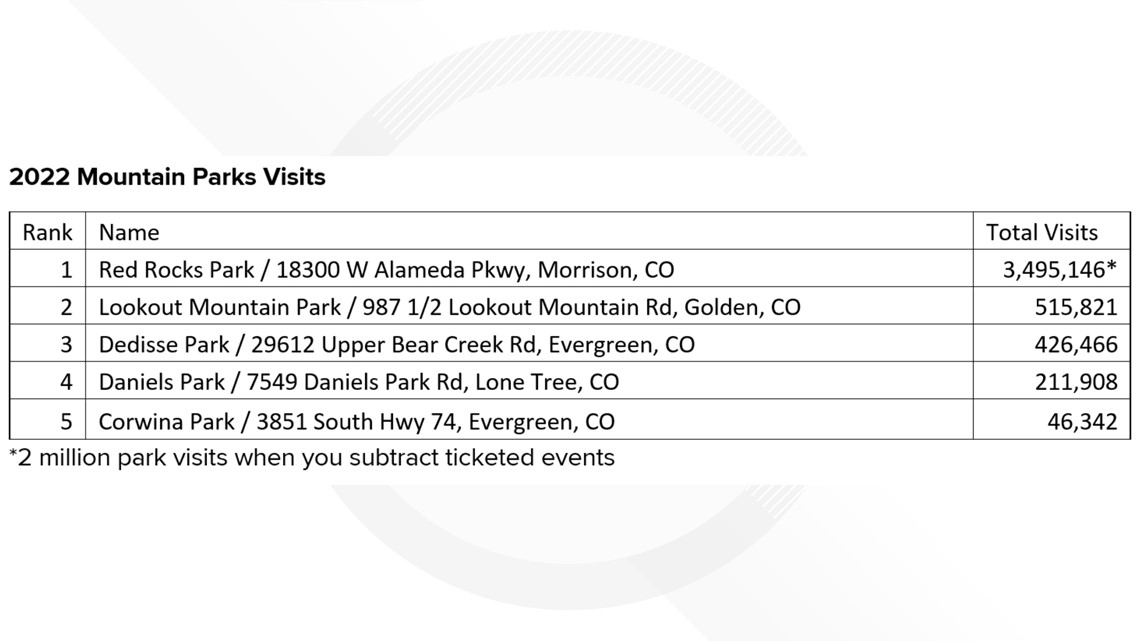
The cell phone data showed how City Park saw more than 1 million visits, while Washington Park, the second busiest regional park, was far back with 869,000 visits.

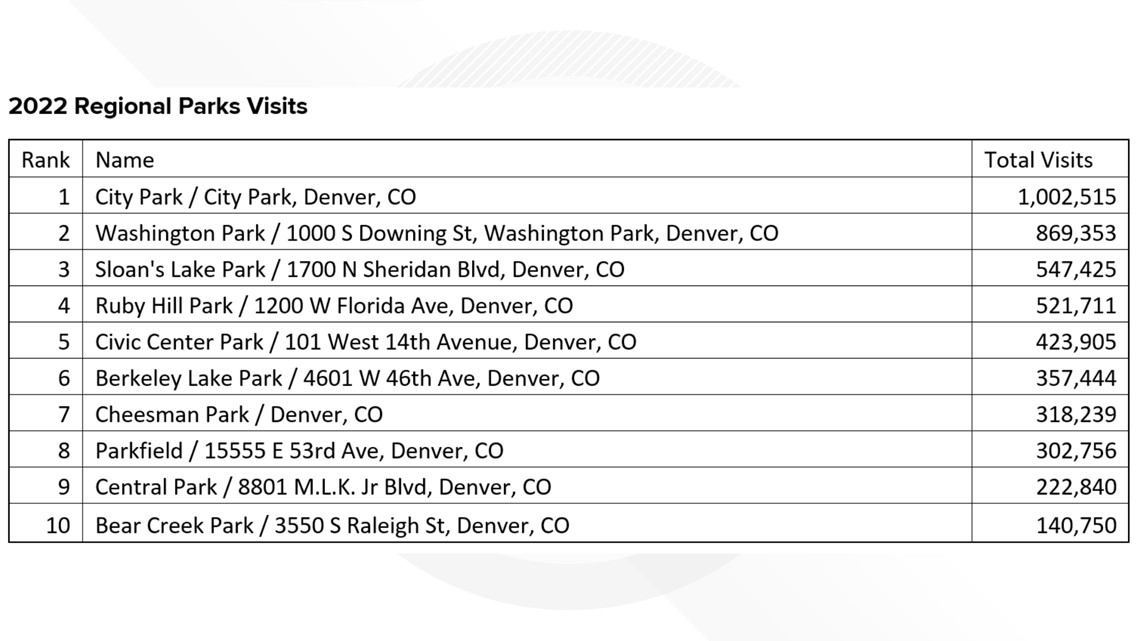
The busiest community park is Barnum in west Denver, with Bible Park in southeast Denver about 67,000 visits behind.

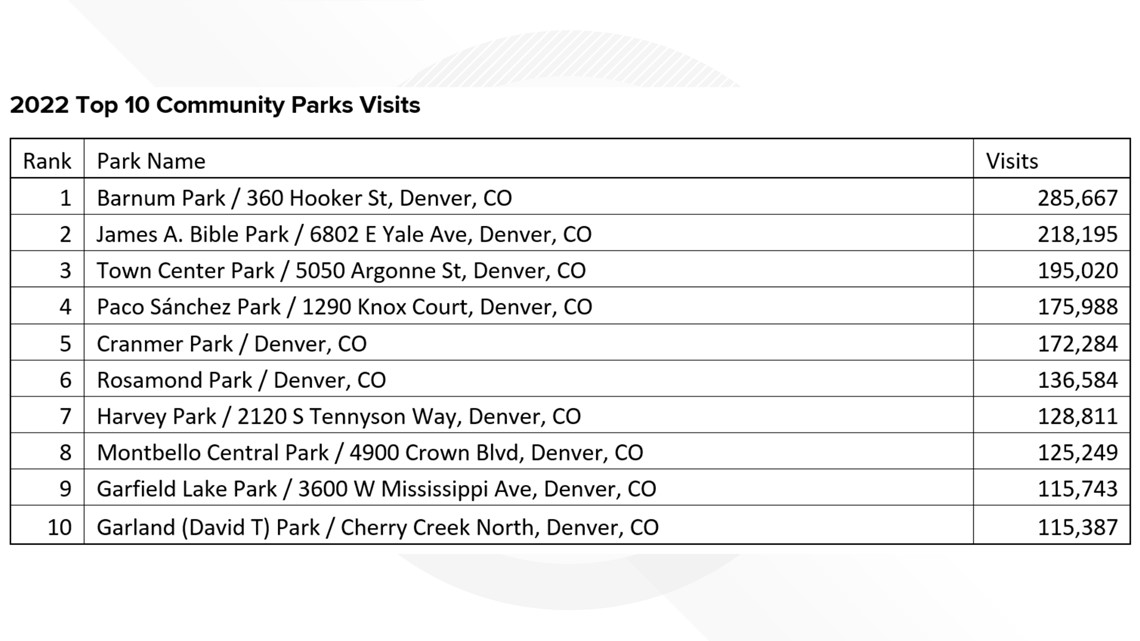
For example, Rohloff shared the data from Rosamond Park in southeast Denver. It is a popular park for lacrosse leagues on weeknights and weekends. In 2022, it was the sixth-busiest community park, with 136,000 total visits from 48,000 visitors.
“We’re talking about the neighborhood that’s in where the park is, only 12% of the visits came from that neighborhood,” Rohloff said. “Two percent of the visits came from the Evergreen zip code.”
That kind of data helps the city determine how to allocate something as basic as a bathroom.
“We can see the visit trend, and when we talk about the porta-let conversation, this is really critical,” Rohloff said. “We say one porta-let for every 1,500 visits for that max day.”
To determine a max day, Rohloff looks for four or five of the busiest summer days and gets an average based on the highest use times.
“The porta-let capacity of this park needs to be able to handle the maximum visitation it got on the highest use day it’s ever gotten last year,” Rohloff said. “The rest of the days will, obviously, be taken care of if that peak day can be managed.”
From an asset standpoint, he looks at city parks like a business with multiple storefronts.
“You want to attract as many customers as you can to your product. This really helps us do that. Say you own a chain of retail stores, you really focus on your underperforming stores,” Rohloff said. “Any retail organization that you think of, McDonalds, Taco Bell, King Soopers, all of them work off of the same methodology.”
When determining how many portable bathrooms are needed at each park, the cell phone data allowed the city to reallocate and go from 29 year-round porta-potties to 104.
“We were able to take units that weren’t being used to their capacity from places like Wash Park and spread them out across the city to places they were needed,” Rohloff said. “We just flooded [Wash] Park with porta-lets because we had no other way of knowing. We knew it was busy, and now that we have information to see how it's changing and how those visitations change over time, we can actually adjust.”
He said the biggest change with the expansion of porta-potties is within neighborhood parks.
“Now La Raza [Park] has a porta-let all year, for virtually the same amount of [city] money,” Rohloff said.
Collecting the data is meant for more than bathroom allocation.
“To be completely frank, we have some parks that don’t get used. And we need to ask ourselves some hard questions about why that park doesn’t get used. Why is it not being visited? Does it not serve the community?” Rohloff said.
In 2022, there were 16.5 million visits to Denver parks. Rohloff was surprised by one of the most underutilized.
“Governors [Park], for example, does not get used what we think it should for a park at that scale,” Rohloff said.
Governors Park is at Seventh and Pennsylvania Avenues just south of the Governor’s Mansion. In 2022, it had 2,703 visits.
Five of the least-visited community parks are in the Central Park area.

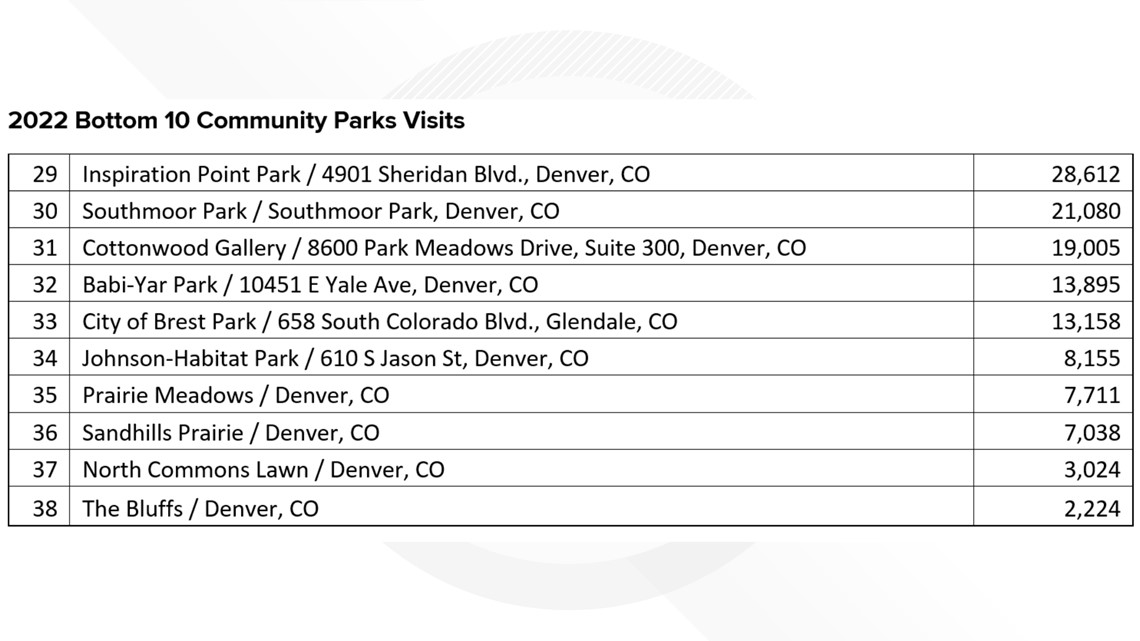
“It could be that they’re under-resourced from an asset perspective. It could be that they have a lot of competition. We know the Central Park neighborhood has a lot of parks and a lot of parks per capita,” Rohloff said. “We know the who, what, where, when. When are they coming. How many people there are. What’s in the park, all that stuff. So, now we can actually get to the -- how do we get this demographic of people that is not visiting our park to come?”
He said he was surprised to learn Loretta Heights was the busiest neighborhood park.
“The lower income parts of the city, the parks are used on a per capita basis more, and a lot more,” Rohloff said.
The one area, he said, that saw more visitors in the winter than the summer was not Ruby Hill Park and its sledding hill.
“Dog parks get used substantially more in the winter because people don’t want to walk their dog,” Rohloff said. “It’s the only thing that goes up, and now we know that.”

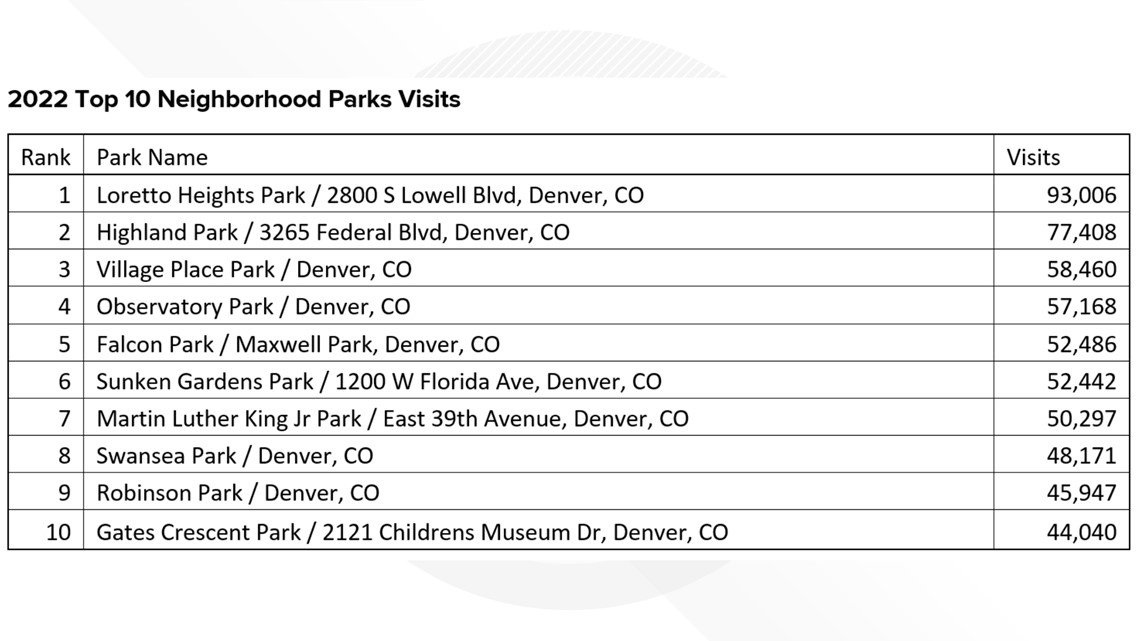

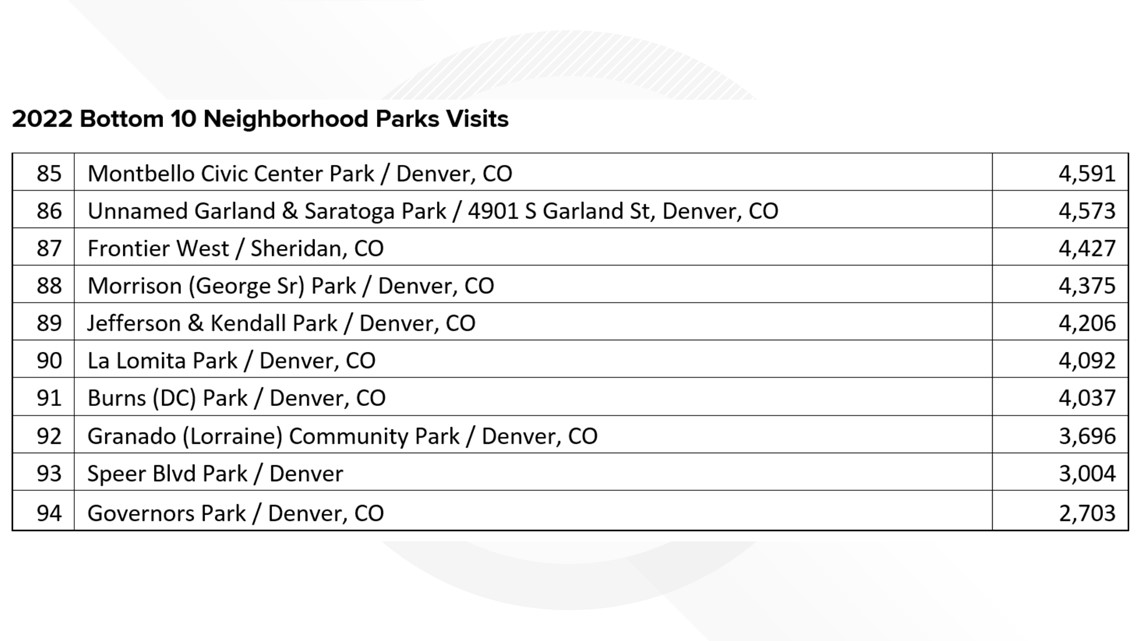
How Denver gets your data
Cell phones are really cameras and texting devices that can sometimes make phone calls.
They also tattle on you everywhere you go. The City of Denver figures out how many porta potties to put in each park based on your cell phone location data.
Several Next with Kyle Clark viewers asked how this can be done without your permission.
“You already gave your permission. If you are using an app that is free, you already gave your permission,” said Edgar Maldonado, associate professor of computer information systems at MSU Denver.
The city uses cell phone data that it gets from the company Placer.ai. The cell phone information is deidentified and aggregated, essentially anonymous without any identifying information about a specific cell phone user.
The data knows where your cell phone has been, just not whose cell phone it is.
"The terms and conditions of your phone are how they have legal access to this information,” said Colten Rohloff, assistant director of Capital Finance and Analytics and Planning Design and Construction for Denver Parks and Recreation. "This data exists whether we use it or not.”
“You just say ‘yes’ to the conditions, and you just start using your nice Sudoku game. That’s how you gave permission,” Maldonado said.
You can go into the settings for each app and disable the location tracking.
Even if you give permission to know your location only when you use the app, you are giving up your data.
“Although, with the Colorado new legislation, you have the right to ask these companies to delete your data,” Maldonado said.
A state data privacy law passed two years ago took effect this month. It requires certain companies to allow you to opt-out of having your personal data sold. The law also requires companies to let you get the data that they collect about you, and you can ask for data to be deleted.
“If you are afraid of sharing your whereabouts, just disable the GPS, disable the Wi-Fi and then they don’t know where you are at,” Maldonado said.
Though, if you turn off your GPS and Wi-Fi, you might just have an overpriced camera and calculator that used to act like a phone.
SUGGESTED VIDEOS: Full Episodes of Next with Kyle Clark


